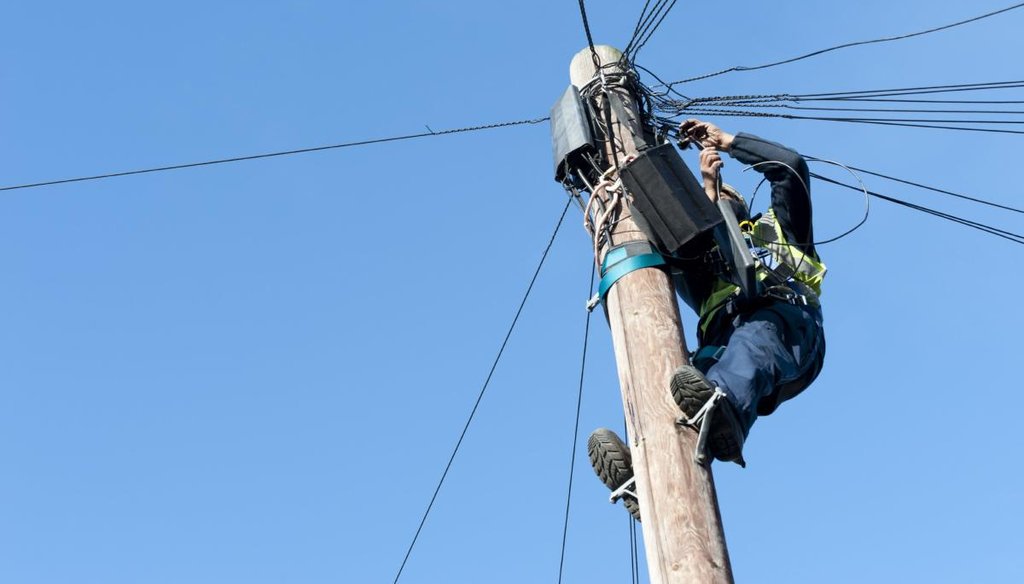

Our only agenda is to publish the truth so you can be an informed participant in democracy.
We need your help.


Man installing telephone and broadband cables on a telgraph pole.
The internet has become a part of everyday American life, and people are more connected now than ever before. However, some Americans do not have access to high quality broadband services.
At the Missouri State Fair, Republican Sen. Roy Blunt addressed an audience about the importance of broadband access for rural residents, saying that two-thirds of rural Missouri residents are lacking broadband access.
Nearly 2/3 of rural Missourians don’t have access to broadband. That needs to change," Blunt posted on Twitter Aug.8, 2017.
The tweet included a video clip from the address. Blunt went on to talk about why he believes broadband is necessary. He also went on to discuss how he is an advocate for broadband issues on the Senate floor.
Blunt’s remarks got us thinking: Are two-thirds of rural Missourians really lacking access to the service?
A spokesperson for Sen. Blunt pointed us to a Wall Street Journal piece, as well as some past research by the PolitiFact team as the sources backing the statement.
Before we delve deeper into the issue, let’s establish what "broadband" means.
The FCC describes it in a 2016 report as the speed benchmark of 25 Mbps download speed and 3 Mbps upload speed for fixed (not mobile) services.
The FCC is required by a portion of the 1996 Telecommunications Act to report on whether Americans are able to access advanced telecommunications capabilities. They define this as, "‘high-quality’ capability that allow users to ‘originate and receive high-quality voice, data, graphics, and video’ services."
Basically, high-speed internet.
In the same report, the FCC said 10 percent of Americans lack access to broadband — 39 percent of rural Americans and 4 percent of Americans living in an urban area.
Currently, many rural Missourians use alternatives to broadband like DSL, or digital subscriber line, which uses the same two-wire copper telephone line used for landlines. Some people just use their phones for internet, but for Northeast and Northwest Missourians, it’s tough to get service. Surprisingly, 8 percent of rural Missourians still use dial-up internet.
While 39 percent of rural Americans live without access to broadband internet, that figure jumps to 61 in Missouri, according to the FCC.
Missouri is lagging compared to surrounding states. Forty-nine percent of rural residents in Kansas are without broadband access, 56 percent in Illinois, 37 percent in Iowa and 48 percent in Arkansas.
The lack of access affects everything from telemedicine to searching for jobs. It even touches agriculture: Janie Dunning, Missouri Farm Bureau’s consultant for broadband, said farmers utilize technology in order to do "precision farming." By combining computers and farm equipment, production can increase, and business can be easier to manage.
Further, when looking at a map provided by the FCC, we can see that in Missouri, even when rural areas have broadband access, most of those residents only have one provider option.
It gets worse.
"One caution on using broadband maps and data — you need to understand how ‘access’ is being counted," said University of Missouri Extension state specialist for community development Sharon Gulick. "In many cases as long as one person or business in the zip code has access, that zip code is considered covered. Also, having it available and it being affordable are also two very different issues."
In most rankings, Missouri is around No. 40 to 47 when it comes to broadband access, Dunning said.
Missouri has over 6 million people living it, 70 percent of whom are in urban areas and 30 percent in rural areas, Dunning said. So with almost a third of the population residing in rural areas, how are there so many without broadband?
When looking at people per square mile, the state average is 87.1 people per square mile. In urban areas, that number skyrockets to 5,000 people per square mile; conversely, some rural areas have as few as one or two people per square mile.
"Even non-profit providers need a return on investment," Dunning said. "Providers prioritize the urban areas since there’s more people who will use their services. It’s just more financially feasible."
Blunt said that nearly two-thirds of rural Missourians don’t have access to broadband. FCC numbers back up his statement.
Experts agree that Missouri has a broadband access issue, and all cite the same FCC report. The 2016 Broadband Progress Report from the FCC states that 61 percent of rural Missourians lack access to broadband. The report is the most recent and uses a benchmark of of 25 Mbps/3 Mbps for high-speed internet.
While 61 percent isn’t 2/3, it’s nearly so, especially in the context of the statement.
We rate Blunt’s claim True.
Tweet, Sen. Roy Blunt, Aug. 8, 2017
News release, Sen. Roy Blunt’s website, Aug. 17, 2017
Federal Communications Commission, 2016 Broadband Progress Report
Federal Communications Commission, "Number of Residential Fixed Broadband Providers at 25 Mbps/3 Mbps"
Federal Communications Commission, "Americans Without Access to Fixed Telecommunications Capability by County"
Email correspondence with Katie Boyd, Press Secretary to Sen. Blunt, Aug. 29, 2017
Stephen Jeanetta, expert, Community Development Program, MU Extension
http://stateofthestates.educationsuperhighway.org/?postalCd=MO, Annual report of K-12 broadband access, Aug. 30, 2017
Email interview with Michelle Kroll, expert, Community development specialist Camden County, MO Aug. 30th, 2017
https://www.dropbox.com/sh/2uzo4m95szmgf1n/AACIceBmtpKDwSP-ytd1N275a?dl=0&preview=2017broadbandwhitepaper.docx, State of the state: broadband, Aug. 29, 2017
https://www.dropbox.com/sh/2uzo4m95szmgf1n/AACIceBmtpKDwSP-ytd1N275a?dl=0&preview=Notesstakeholdermeeting.pdf, Notes from broadband stakeholder meeting, Aug. 29, 2017
https://www.dropbox.com/sh/2uzo4m95szmgf1n/AACIceBmtpKDwSP-ytd1N275a?dl=0&preview=SURVEY+ON+BROADBAND.pdf, survey on broadband - July 2017, Aug. 29, 2017
Phone interview with Janie Dunning, Broadband consultant for Missouri Farm Bureau, Aug. 29, 2017
Email correspondence with Kyle Constant, Digital Services and Marketing Librarian, Trails Regional Library, Sept. 5, 2017
Trails Regional Library, FY 2016 Statistical Report
In a world of wild talk and fake news, help us stand up for the facts.
